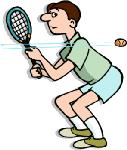take one woman with low self esteem, but quite good hair
add one moronic illness
stir in some medication which causes hair to fall out
mix it all up and this is what you get...
Wednesday, August 23, 2006
What the deuce?

When you join a tennis club, you enter a whole new world of jargon. Even if you've been a tennis fan and watched it on television for many years, you'll find that the vocabulary used at the club has some interesting variations.
Take the scoring, for example. The point system during games is not straightforward at the best of times - if anyone can explain the logic of starting at "love", proceeding to fifteen, then thirty, then forty (I could kind of understand if it were forty-five), I'd be very grateful. But at the club, the confusion is worsened by the fact that, instead of fifteen, they say five. Yes, five. "Five love", say, is the same as "fifteen love". Thirty is still thirty, forty is still forty, but fifteen becomes five. You almost feel a fool for calling it fifteen.
When the game goes to deuce (which is, thankfully, still called deuce), things become interesting again. Rather than saying "Advantage [insert player/team name]", they will say "'van in" if the advantage is on the server's side, or "'van out" if the advantage is on the receiver's side. This may have evolved because, at the club, you cannot always be expected to remember everyone's name, so "in" and "out" can cover a multitude of forgotten names. This is quite likely, as I've lost count of the number of times I've had to reintroduce myself or correct a certain club member who insists on calling me Zoë or Sophie (both of which are perfectly nice names; neither of which is my own). As for "van" - well, I guess it's just laziness. Who needs those extra syllables, anyway?
Line calls offer another departure from what you're used to when your only experience of tennis is on the television. Rather that shouting something approximating "Out!" or "Fault!" when the ball is over the line, you simply shout "No!". If there's any doubt over a whether a ball is good or not, you say "Yes" if it's good, and "No" if it's out.
If the first serve touches the net cord and still lands in the box, you will not hear the expected "Net!", "Let!" or "First serve", but instead: "Two!". "Two" is the tennis club shorthand (or should that be shortmouth...) for saying "let, first service" ( i.e. you still have *two* attempts at serving).
Another quirk is the "rough or smooth" débacle. When deciding who will serve, in the absence of a coin to toss, people spin their racket and shout "rough or smooth" to the opponent, who must then shout back one of these options. It took me a long time to work out what was meant by "rough or smooth". I eventually discovered that "rough" actually refers to the side of the racquet where the string knots are visible. Whichever side is uppermost when the racquet has finished spinning indicates who should win the "toss".
Having been a member of three different tennis clubs, I think I can say with some confidence that these terms are used consistently.
However, knowing the lingo is all well and good; unfortunately, though, it does not help one bit in improving my performance on the tennis court, which could at best be described as "erratic".
This post was brought to you from the comfort of my sofa and was made possible by my new wireless router. Yay!




<< Home